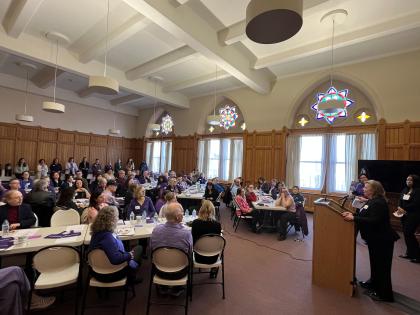Connecticut State Alzheimer’s Plan Overview

In 2013, Connecticut’s legislature passed Special Act 13-11, creating the state’s Task Force on Alzheimer’s Disease and Dementia. The Task Force met to develop and publish a list of recommendations in December 2013 in the Report of the Task Force on Alzheimer’s Disease and Dementia. The initial state plan focused on short-term goals to be completed over the course of three to five years. In January 2020, the Task Force published an update to the state plan, focusing on progress made, updating recommendations and expanding the role for the Connecticut Department of Public Health. In 2023, the state plan was updated after engaging with stakeholders and community partners. The state plan was informed by the twenty-five actions of 2018-2023 Healthy Brain Initiative Road Map and includes six goals to help address Alzheimer’s and dementia across the state.
Connecticut 2026 Policy Priorities

Improve Quality of Home Care Through Dementia Training
People living with Alzheimer’s and other dementia face unique health care needs. A cornerstone of providing quality dementia care is dementia-specific training for home care staff. Home health aides, however, often do not have sufficient knowledge on dementia to effectively support those living with dementia. The Alzheimer’s Association is calling on state lawmakers to pass legislation requiring a dementia-specific training requirement for homemaker companion agency staff in the state.

Medicaid Reimbursement for Care Planning and Cognitive Assessments
Early intervention can provide individuals living with dementia time to plan for the future, adopt lifestyle changes, participate in clinical trials and live more fully with a higher quality of life for as long as possible. Medicare beneficiaries in Connecticut have access to a billing code that covers cognitive assessments and care planning. However, those on Medicaid do not have access to this critical service. The Alzheimer’s Association is calling on state officials to ensure Medicaid coverage of CPT Billing Code 99483, which would reimburse providers for care planning and cognitive assessments for patients not enrolled in Medicare.
Connecticut State Advocacy Day
Join us at the State Capitol on Wednesday, March 11, 2026, for Alzheimer’s Advocacy Day — a powerful opportunity to make your voice heard. Stand alongside fellow advocates as we meet with legislators to push for policies that improve care and support for those impacted by Alzheimer’s and other dementias across our state. Your story matters — together, we can create change.
Sign Up to Learn About Advocacy Opportunities in Connecticut

Find My Chapter
Together, we’re making an impact. Find an Alzheimer’s Association chapter in your community for more ways to engage.
Contact Us
State Affairs Contact: Christianne Kovel
Phone: 860.362.0951
Email: ckovel@alz.org
76,800
people living with Alzheimer’s in Connecticut
130,000
Connecticuters are providing unpaid care
$1.3 Billion
Medicaid cost of caring for people living with Alzheimer’s (2025)
1,080
deaths from Alzheimer’s in 2022
15%
in hospice with a primary diagnosis of dementia
146
number of geriatricians in Connecticut in 2021
Resources to Drive Change in Connecticut
The following resources developed by AIM and the Alzheimer’s Association will help you learn more about the issues impacting people living with Alzheimer’s and their caregivers, how Connecticut policymakers are addressing these gaps, and how you can help drive change.